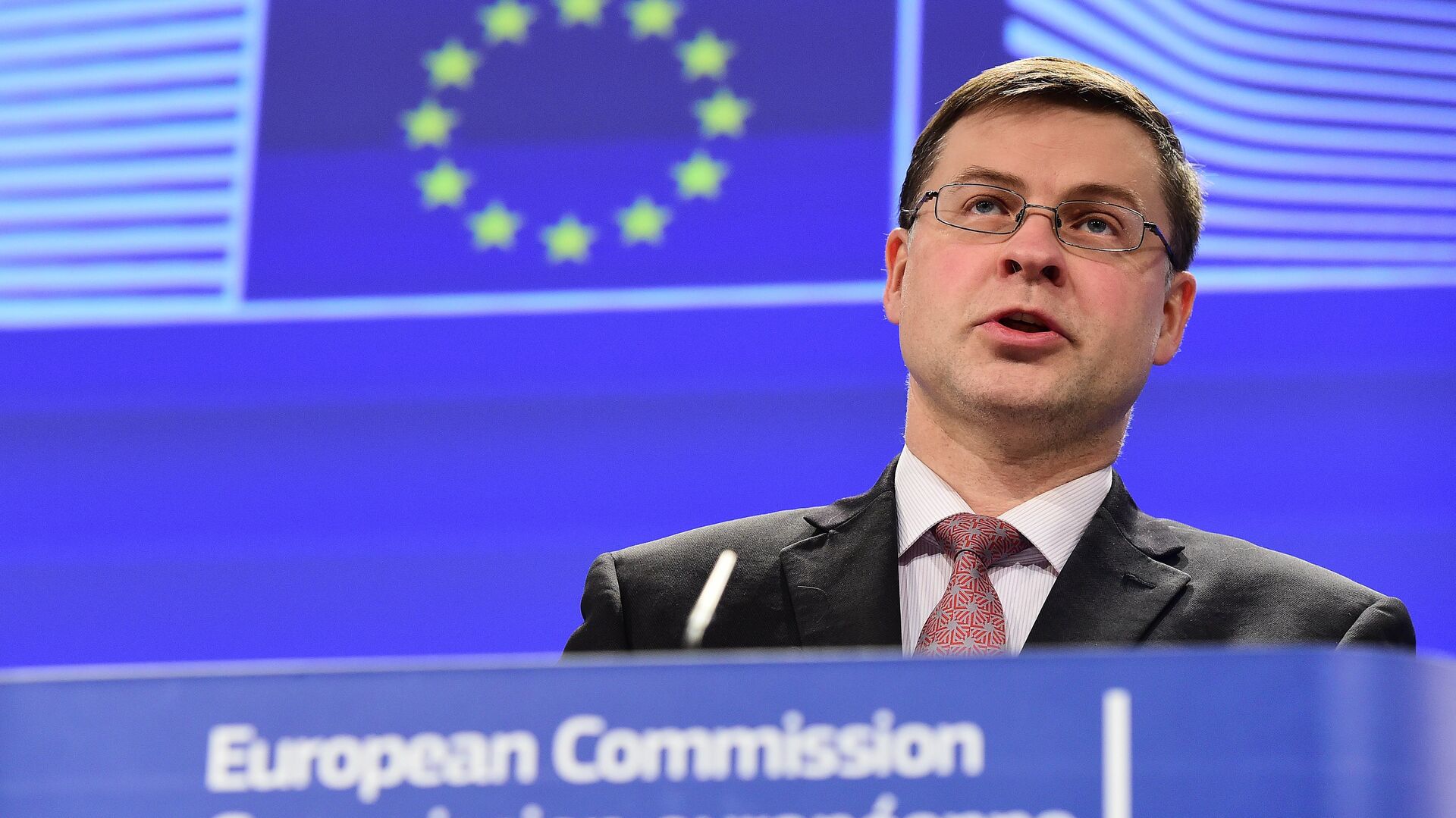https://sputnikglobe.com/20230925/eu-flexes-muscles-on-fair-trade-with-china-1113646731.html
EU Flexes Muscles On ‘Fair Trade’ With China
EU Flexes Muscles On ‘Fair Trade’ With China
Sputnik International
Against a backdrop of mounting tensions, the EU remains steadfast in its resolve to foster equitable trade relations with China. This determination has driven the bloc to initiate an anti-subsidy probe into Chinese e-cars. However, the bloc's trade chief's trip to China aligns with its protectionist thrust.
2023-09-25T13:42+0000
2023-09-25T13:42+0000
2023-09-25T13:42+0000
economy
valdis dombrovskis
annalena baerbock
emmanuel macron
china
france
jinping
european union (eu)
european commission
tsinghua university
https://cdn1.img.sputnikglobe.com/img/101869/04/1018690413_0:276:4235:2658_1920x0_80_0_0_71b5480be4b4a4dbfe8e3a69289f2e64.jpg
On Monday, in a diplomatic overture to China, the European Union's principal trade negotiator conveyed a clear message, asserting the bloc's unwavering stance in upholding balanced competition and protecting its interests.“The lack of reciprocity and level playing field from China, coupled with wider geopolitical shifts, has forced the EU to become more assertive,” said Valdis Dombrovskis, an executive vice-president at the European Commission, as stated in the scripted remarks scheduled for delivery during a keynote address at Tsinghua University.Dombrovskis stressed that competition stands as a cornerstone of the European Union's economic landscape, serving to invigorate and advance the prowess of our corporate entities.Nevertheless, a stringent emphasis on fairness is paramount. Hence, the EU is moving to redress the issue.The visit by the Latvian bureaucrat is consistent with the European Union’s attempts to fortify its defensive trade mechanisms. The bloc recently commenced an anti-subsidy investigation into Chinese electric vehicles (EVs), arguing that this is imperative to shield domestic employment and supply chains. The EU maintains that China's alleged market inundation with cost-effective EVs is inequitable.The Chinese Ministry of Commerce also noted that its EV sector has experienced rapid evolution, driven by sustained advances in scientific and technological innovation, alongside robust industrial and supply chains, which have won it a global clientele, including consumers in the European Union.Collaboration between the two parties is essential in shaping a market landscape that is equitable, non-discriminatory, and characterized by predictability, thereby fostering mutual advances in the China-EU EV industry, firmly opposing any forms of trade protectionism.Dombrovskis' visit to China is likely to turn the spotlight on the EV question as it takes precedence in discussions. Well-informed sources intimate that the vice-president's mission is to elucidate the European Union's stance to Chinese counterparts, underlining the need for specific agreements to reset the bilateral relationship.In his statement, Dombrovskis said that the European Union's de-risking strategy is definitely non-protectionist. He clarified that the EU intends to implement impartial measures concerning individual countries.In conjunction with the Monday engagement alongside vice-premier He Lifeng, the European Union's trade chief will take part in meetings with counterparts and interfacing with European business representatives in Shanghai and Beijing. The present talks indicate a summit between President Xi Jinping and the EU's Ursula von der Leyen later this year.Between 5 and 7 April 2023, French President Emmanuel Macron, European Commission President Von der Leyen, and a delegation of high-ranking officials conferred with Chinese President Xi Jinping.Macron stirred controversy by stating it as imperative for Europe to steer clear of being drawn into issues related to China and Taiwan and to maintain a measured distance from any foreign policy led by the United States to prevent Europe from assuming a role as one of "America's followers". His position centered on advocating Europe's "strategic autonomy".Subsequently, Germany's Foreign Minister Annalena Baerbock, during her official visit to China on 13 to 17 April 2023, strove to project a united front. Baerbock emphasized the relevance of President Macron's response to criticism, highlighting its weight in diplomatic discussions, stating that this "once again showed that France's China policies and EU-China policies "are one and the same".Though refraining from a definitive stance on Berlin's position concerning the EU's autonomy from the US, Baerbock alluded to the need for EU member states to "pursue common strategic approaches" as she homed in on the economic risks entailed by a potential conflict erupting in the Taiwan Strait.Sources familiar with the EU’s view on China feel that ongoing deliberations within the European Union and its member states focus on reevaluating their approach towards China. Bolstered by augmented geo-economic capabilities in recent times, the EU is emphasizing a strategic "de-risking" agenda. This agenda encompasses the implementation of outbound investment scrutiny and protecting the export of sensitive technologies, which range from advanced microelectronics to quantum technology, robotics, biotechnology, and artificial intelligence.
china
france
jinping
Sputnik International
feedback@sputniknews.com
+74956456601
MIA „Rossiya Segodnya“
2023
Chimauchem Nwosu
https://cdn1.img.sputnikglobe.com/img/07e7/09/01/1113046371_0:99:1536:1635_100x100_80_0_0_9c5c627283eca931c39fe4852bbb301c.jpg
Chimauchem Nwosu
https://cdn1.img.sputnikglobe.com/img/07e7/09/01/1113046371_0:99:1536:1635_100x100_80_0_0_9c5c627283eca931c39fe4852bbb301c.jpg
News
en_EN
Sputnik International
feedback@sputniknews.com
+74956456601
MIA „Rossiya Segodnya“
Sputnik International
feedback@sputniknews.com
+74956456601
MIA „Rossiya Segodnya“
Chimauchem Nwosu
https://cdn1.img.sputnikglobe.com/img/07e7/09/01/1113046371_0:99:1536:1635_100x100_80_0_0_9c5c627283eca931c39fe4852bbb301c.jpg
european union, eu, china-eu relations, trade negotiation, valdis dombrovskis, tsinghua university, balanced competition, level playing field, economic landscape, defensive trade mechanisms, anti-subsidy investigation, chinese electric vehicles, protectionist measures, commerce ministry, electric vehicle industry, de-risking strategy, ursula von der leyen, xi jinping, emmanuel macron, strategic autonomy, annalena baerbock, berlin's position, taiwan strait, geoeconomic capabilities, outbound investment scrutiny, sensitive technologies, advanced microelectronics, quantum technology, robotics, biotechnology, artificial intelligence, central and eastern european member states, washington ties.
european union, eu, china-eu relations, trade negotiation, valdis dombrovskis, tsinghua university, balanced competition, level playing field, economic landscape, defensive trade mechanisms, anti-subsidy investigation, chinese electric vehicles, protectionist measures, commerce ministry, electric vehicle industry, de-risking strategy, ursula von der leyen, xi jinping, emmanuel macron, strategic autonomy, annalena baerbock, berlin's position, taiwan strait, geoeconomic capabilities, outbound investment scrutiny, sensitive technologies, advanced microelectronics, quantum technology, robotics, biotechnology, artificial intelligence, central and eastern european member states, washington ties.
EU Flexes Muscles On ‘Fair Trade’ With China
Against a backdrop of mounting tensions, the EU remains steadfast in its resolve to foster equitable trade relations with China. This determination has driven the bloc to initiate an anti-subsidy probe into electric vehicles (EVs) made in China. However, the trip by the bloc's trade chief to China exposes its protectionist thrust.
On Monday, in a diplomatic overture to China, the European Union's principal trade negotiator conveyed a clear message, asserting the bloc's unwavering stance in upholding balanced competition and protecting its interests.
“The lack of reciprocity and level playing field from China, coupled with wider geopolitical shifts, has forced the EU to become more assertive,” said Valdis Dombrovskis, an executive vice-president at the European Commission, as stated in the scripted remarks scheduled for delivery during a keynote address at Tsinghua University.
Dombrovskis stressed that competition stands as a cornerstone of the European Union's economic landscape, serving to invigorate and advance the prowess of our corporate entities.
Nevertheless, a stringent emphasis on fairness is paramount. Hence, the EU is moving to redress the issue.
The visit by the Latvian bureaucrat is consistent with the European Union’s attempts to fortify its defensive trade mechanisms. The bloc recently commenced an
anti-subsidy investigation into Chinese electric vehicles (EVs), arguing that this is imperative to shield domestic employment and supply chains. The EU maintains that China's alleged market inundation with cost-effective EVs is inequitable.
In response to the investigation, China's Commerce Ministry has condemned the ongoing investigation as a stark manifestation of protectionist measures. The ministry has explained that the probe's core objective is to shield the union’s domestic automotive industry in the spirit of "fair competition".
The Chinese Ministry of Commerce also noted that
its EV sector has experienced rapid evolution, driven by sustained advances in scientific and technological innovation, alongside robust industrial and supply chains, which have won it a global clientele, including consumers in the European Union.
Collaboration between the two parties is essential in shaping a market landscape that is equitable, non-discriminatory, and characterized by predictability, thereby fostering mutual advances in the China-EU EV industry, firmly opposing any forms of trade protectionism.
Dombrovskis' visit to China is likely to turn the spotlight on the EV question as it takes precedence in discussions. Well-informed sources intimate that the vice-president's mission is to elucidate the European Union's stance to Chinese counterparts, underlining the need for specific agreements to reset the bilateral relationship.
In his statement, Dombrovskis said that the European Union's de-risking strategy is definitely non-protectionist. He clarified that the EU intends to implement impartial measures concerning individual countries.
“Our approach to economic security is proportionate and precise - our action will be purely risk-based. De-risking is, therefore, a strategy to maintain our openness, not undermine it,” he noted.
In conjunction with the Monday engagement alongside vice-premier He Lifeng, the European Union's trade chief will take part in meetings with counterparts and interfacing with European business representatives in Shanghai and Beijing. The present talks indicate a summit between President Xi Jinping and the EU's Ursula von der Leyen later this year.
Between 5 and 7 April 2023, French President Emmanuel Macron, European Commission President Von der Leyen, and a delegation of high-ranking officials conferred with Chinese President Xi Jinping.
Macron stirred controversy by stating it as imperative for Europe to steer clear of being drawn into issues related to China and Taiwan and to maintain a measured distance from any foreign policy led by the United States to prevent Europe from assuming a role as one of "America's followers". His position centered on advocating Europe's "strategic autonomy".
Subsequently, Germany's Foreign Minister Annalena Baerbock,
during her official visit to China on 13 to 17 April 2023, strove to project a united front. Baerbock emphasized the relevance of President Macron's response to criticism, highlighting its weight in diplomatic discussions, stating that this "once again showed that France's China policies and EU-China policies "are one and the same".
Though refraining from a definitive stance on Berlin's position concerning the EU's autonomy from the US, Baerbock alluded to the need for EU member states to "pursue common strategic approaches" as she homed in on the economic risks entailed by a potential conflict erupting in the Taiwan Strait.
"A military escalation in the Taiwan Strait.....would be a worst-case scenario globally and affect us as one of the biggest industrial nations in particular," Baerbock said.
Sources familiar with the EU’s view on China feel that ongoing deliberations within the European Union and its member states focus on reevaluating their approach towards China. Bolstered by augmented geo-economic capabilities in recent times, the EU is emphasizing a strategic "de-risking" agenda. This agenda encompasses the implementation of outbound investment scrutiny and protecting the export of sensitive technologies, which range from advanced microelectronics to quantum technology, robotics, biotechnology, and artificial intelligence.



